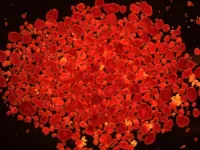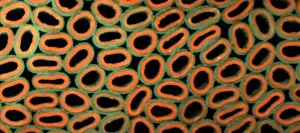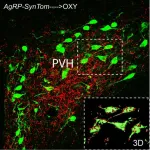(Press-News.org) A new therapy for brittle type 1 diabetes, the only treatment currently approved by the U.S. Food and Drug Administration, is available exclusively at UI Health in Chicago.
Pancreatic islet cell therapy is a treatment approved by the FDA only for adults with type 1 diabetes who struggle to control their blood sugar levels due to frequent episodes of severe low blood sugar and hypoglycemia unawareness, a condition that occurs when patients can’t detect that their blood sugar is dropping. This new therapy, called Lantidra, is derived from a deceased donor pancreas. To regulate blood glucose, the drug is infused into the patient’s liver where insulin is produced. Lantidra requires a donor match determined by the United Network for Organ Sharing.
According to Dr. Enrico Benedetti, head of surgery at UI Health, most patients in the clinical trial no longer required insulin one year after their transplant.
“In previous clinical trials, 70% of patients who received Lantidra no longer required insulin one year post islet transplant and over 90% no longer experienced hypoglycemia,” said Benedetti, who was instrumental in the development of Lantidra.
Before islet cell transplantation, the only treatment option for brittle type 1 diabetes was a pancreas transplant.
If the Lantidra therapy is successful, the islet cells lodge in the small blood vessels of the liver and begin producing insulin. Patients must take immunosuppressant drugs to prevent rejection of the islet cells. In some cases, patients require more than one infusion of donor islet cells to produce enough insulin. The success of the treatment varies from patient to patient.
Type 1 diabetes is a chronic autoimmune disease that requires lifelong care. Patients with type 1 diabetes need multiple daily insulin injections or an insulin pump because their own immune system destroys the insulin-producing cells of the pancreas. Even with insulin, they can develop life-threatening complications, including damage to the heart and blood vessels, eyes, nerves and kidneys. The cause of type 1 diabetes is unknown.
According to the National Institutes of Health, more than 1.4 million people in the United States have type 1 diabetes. Roughly 80,000 people have brittle type 1 diabetes, a more severe form of type 1 diabetes. The disease can lead to blindness, kidney failure, limb amputation, stroke and heart attack.
Lantidra, approved by the FDA in June 2023, was developed through research at University of Illinois Chicago. The clinical trials that supported Lantidra were conducted at UI Health, UIC’s academic health enterprise. The clinical data was licensed to CellTrans Inc. to develop the therapy for FDA approval.
Lantidra joins Phexxi, Prezista, Shingrix and Tice BCG in UIC’s portfolio of FDA-approved therapies.
“Our team has come full circle with this product, and we are elated to be at the finish line with this huge project that started in 2004,” said Dr. Lorenzo Gallon, medical director of UI Health’s abdominal organ transplant program and director of transplant research and the transplant research laboratory.
Dr. José Oberholzer, founder and president of CellTrans Inc. and the principal investigator of the islet transplant clinical trials completed at UIC, said Lantidra is “the culmination of more than 20 years of collaborative work.
“The FDA approval is a significant milestone achieved as a result of physicians and co-investigators, a dedicated nursing and isolation team and a small academic startup company,” Oberholzer said.
Patients must meet qualifications to be considered for Lantidra. Eligible patients must be 18 years old or older, have type 1 diabetes for more than five years, be insulin-dependent and have a body mass index lower than 27. Eligible patients also need to have experienced either a serious episode of low blood sugar in the past three years or severe hypoglycemia unawareness, despite trying to manage their diabetes with insulin. It is recommended that eligible patients have no other serious health problems with their heart, lungs, liver or brain and have no active infections.
To learn more about the UI Health Islet Cell Transplant Program, visit islet.uihealth.care.
Disclaimer:
This press release is intended for informational purposes only and is not intended to promote or advertise any product. The information presented herein reflects the current status of Lantidra as of the date of publication. For complete and detailed information on the product, including its approved uses, dosing and safety profile, please refer to the full prescribing information or consult with a healthcare professional. UI Health makes no representations regarding the future availability or efficacy of the product, and the content provided should not be construed as medical advice.
END
New therapy from UI Health offers FDA-approved treatment option for brittle type 1 diabetes
Lantidra is the only treatment currently approved by the U.S. Food and Drug Administration for the treatment of type 1 diabetes.
2024-11-25
ELSE PRESS RELEASES FROM THIS DATE:
Alzheimer's: A new strategy to prevent neurodegeneration
2024-11-25
A future treatment for Alzheimer disease may involve a nasal spray. Researchers at Università Cattolica and Fondazione Policlinico Universitario A. Gemelli IRCCS have discovered that by inhibiting the brain enzyme S-acyltransferase (zDHHC) through a nasal-spray drug, they can counteract the cognitive decline and brain damage typical of the disease. The study has been led by Professor Claudio Grassi, Director of the Neuroscience Department, and Professor Salvatore Fusco, with the collaboration of the University of Catania.
The researchers observed that the post-mortem brains of Alzheimer patients contained an excess of S-acyltransferase, ...
A clue to what lies beneath the bland surfaces of Uranus and Neptune
2024-11-25
Diamond rain? Super-ionic water?
These are just two proposals that planetary scientists have come up with for what lies beneath the thick, bluish, hydrogen-and-helium atmospheres of Uranus and Neptune, our solar system's unique, but superficially bland, ice giants.
A planetary scientist at the University of California, Berkeley, now proposes an alternative theory — that the interiors of both these planets are layered, and that the two layers, like oil and water, don't mix. That configuration neatly explains the planets' unusual magnetic fields and implies ...
Researchers uncover what makes large numbers of “squishy” grains start flowing
2024-11-25
Researchers Samuel Poincloux (currently at Aoyama Gakuin University) and Kazumasa A. Takeuchi of the University of Tokyo have clarified the conditions under which large numbers of “squishy” grains, which can change their shape in response to external forces, transition from acting like a solid to acting like a liquid. Similar transitions occur in many biological processes, including the development of an embryo: cells are “squishy” biological “grains” that form solid tissues and sometimes flow to form different organs. Thus, the experimental and theoretical framework elaborated here will help separate the ...
Scientists uncover new mechanism in bacterial DNA enzyme opening pathways for antibiotic development
2024-11-25
Researchers from Durham University, Jagiellonian University (Poland) and the John Innes Centre have achieved a breakthrough in understanding DNA gyrase, a vital bacterial enzyme and key antibiotic target.
This enzyme, present in bacteria but absent in humans, plays a crucial role in supercoiling DNA, a necessary process for bacterial survival.
Using high-resolution cryo-electron microscopy the researchers reveal unprecedented detail of gyrase’s action on DNA, potentially opening doors for new antibiotic therapies against resistant bacteria.
The research is published in Proceedings of the ...
New study reveals the explosive secret of the squirting cucumber
2024-11-25
UNDER EMBARGO UNTIL 20:00 GMT / 15:00 ET MONDAY 25 NOVEMBER 2024
New study reveals the explosive secret of the squirting cucumber
IMAGES AND VIDEO AVAILABLE – SEE NOTES SECTION BELOW
A team led by the University of Oxford has solved a mystery that has intrigued scientists for centuries: how does the squirting cucumber squirt? The findings, achieved through a combination of experiments, high-speed videography, image analysis, and advanced mathematical modelling, have been published today (25 November) in The Proceedings of the National Academy of Sciences (PNAS).
The squirting cucumber (Ecballium elaterium, from the Greek ‘ekballein,’ meaning to throw out) is named for ...
Vanderbilt authors find evidence that the hunger hormone leptin can direct neural development in a leptin receptor–independent manner
2024-11-25
Researchers from the Vanderbilt University School of Medicine Basic Sciences have uncovered the first example of activity-dependent development of hypothalamic neural circuitry. Although previous research has shown that the hormone leptin acts directly on hunger neurons through leptin receptors to promote the development of neural circuitry, results that will be published in PNAS on Nov. 25 indicate that certain neurons that do not express leptin receptors are nonetheless sensitive to its activity.
The research, led by the lab of Richard Simerly, Louise B. McGavock Professor and professor of molecular physiology ...
To design better water filters, MIT engineers look to manta rays
2024-11-25
Filter feeders are everywhere in the animal world, from tiny crustaceans and certain types of coral and krill, to various molluscs, barnacles, and even massive basking sharks and baleen whales. Now, MIT engineers have found that one filter feeder has evolved to sift food in ways that could improve the design of industrial water filters.
In a paper appearing this week in the Proceedings of the National Academy of Sciences, the team characterizes the filter-feeding mechanism of the mobula ray — a family of ...
Self-assembling proteins can be used for higher performance, more sustainable skincare products
2024-11-25
If you have a meticulous skincare routine, you know that personal skincare products (PSCPs) are a big business. The PSCP industry will reach $74.12 billion USD by 2027, with an annual growth rate of 8.64%. With such competition, companies are always looking to engineer themselves an edge, producing products that perform better without the downsides of current offerings.
In a new study published in ACS Applied Polymer Materials from the lab of Professor of Chemical and Biomolecular Engineering Jin Kim Montclare, researchers have created a novel protein-based gel as a potential ingredient in sustainable and high-performance PSCPs. This protein-based ...
Cannabis, maybe, for attention problems
2024-11-25
Cannabis — whether marijuana itself or various products containing cannabinoids and/or THC, the main psychoactive compound in weed – have been touted as panaceas for everything from anxiety and sleep problems to epilepsy and cancer pain.
Nursing researcher Jennie Ryan, PhD, at Thomas Jefferson University, studies the effects of cannabis on symptoms of attention deficit hyperactivity disorder (ADHD). Current medical guidelines for ADHD include medications such as Adderall and cognitive behavioral therapy. ...
Building a better path to recovery for OUD
2024-11-25
A new study led by Thomas Jefferson University researchers highlights critical healthcare gaps that hinder long-term recovery for people living with opioid use disorders (OUD) in Philadelphia.
The researchers conducted 13 focus groups with 70 participants accessing various types of OUD treatment. Participants reported several challenges, such as lengthy and restrictive assessment processes, inadequate operating hours and lack of sufficient withdrawal management. Participants also reported broader socio-economic needs, such as housing and income support, as barriers to their recovery.
Meghan Reed, PhD, MPH, senior ...
LAST 30 PRESS RELEASES:
Billion-DKK grant for research in green transformation of the built environment
For solar power to truly provide affordable energy access, we need to deploy it better
Middle-aged men are most vulnerable to faster aging due to ‘forever chemicals’
Starving cancer: Nutrient deprivation effects on synovial sarcoma
Speaking from the heart: Study identifies key concerns of parenting with an early-onset cardiovascular condition
From the Late Bronze Age to today - Old Irish Goat carries 3,000 years of Irish history
Emerging class of antibiotics to tackle global tuberculosis crisis
Researchers create distortion-resistant energy materials to improve lithium-ion batteries
Scientists create the most detailed molecular map to date of the developing Down syndrome brain
Nutrient uptake gets to the root of roots
Aspirin not a quick fix for preventing bowel cancer
HPV vaccination provides “sustained protection” against cervical cancer
Many post-authorization studies fail to comply with public disclosure rules
GLP-1 drugs combined with healthy lifestyle habits linked with reduced cardiovascular risk among diabetes patients
Solved: New analysis of Apollo Moon samples finally settles debate about lunar magnetic field
University of Birmingham to host national computing center
Play nicely: Children who are not friends connect better through play when given a goal
Surviving the extreme temperatures of the climate crisis calls for a revolution in home and building design
The wild can be ‘death trap’ for rescued animals
New research: Nighttime road traffic noise stresses the heart and blood vessels
Meningococcal B vaccination does not reduce gonorrhoea, trial results show
AAO-HNSF awarded grant to advance age-friendly care in otolaryngology through national initiative
Eight years running: Newsweek names Mayo Clinic ‘World’s Best Hospital’
Coffee waste turned into clean air solution: researchers develop sustainable catalyst to remove toxic hydrogen sulfide
Scientists uncover how engineered biochar and microbes work together to boost plant-based cleanup of cadmium-polluted soils
Engineered biochar could unlock more effective and scalable solutions for soil and water pollution
Differing immune responses in infants may explain increased severity of RSV over SARS-CoV-2
The invisible hand of climate change: How extreme heat dictates who is born
Surprising culprit leads to chronic rejection of transplanted lungs, hearts
Study explains how ketogenic diets prevent seizures
[Press-News.org] New therapy from UI Health offers FDA-approved treatment option for brittle type 1 diabetesLantidra is the only treatment currently approved by the U.S. Food and Drug Administration for the treatment of type 1 diabetes.







